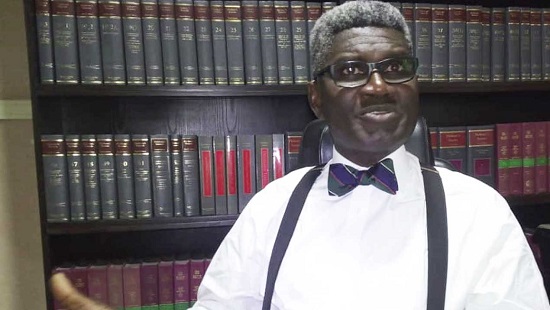This post has already been read 2079 times!
Mr. Norrison I. Quakers, a Senior Advocate of Nigeria (SAN), is a seasoned lawyer with decades of experience in legal practice. He has vast experience and advises on all aspects of commercial and corporate law including business structuring. He litigated on the constitutionality of ‘holding charge’ amongst other cases of constitutional and legal significance.Quakers is a skillful trial and investment lawyer with special interests in litigation, maritime law, energy law, real property, arbitration, commercial/transactional/insolvency practice as well as public law and policy development/legislative advocacy.He has been identified as one of the top 100 lawyers in Nigeria in City Lawyer Publishers list and was called to the inner bar in 2011. He is a member of several professional bodies including but not limited to the Chartered Institute of Arbitrators, Nigerian Maritime Association, Maritime Arbitration of Nigeria. He was also the Secretary to the national working group on the review of the law of evidence and administration of justice in Nigeria.
The recent suspension of the Chief Justice of Nigeria (CJN), Walter Onnoghen, has raised different shreds of views. Some lawyers are arguing that the federal government apparently sidestepped the National Judicial Council (NJC) because it feared NJC would shield the CJN who chairs the body, if the matter went to it. Therefore, they are calling for a constitutional overhaul of the NJC. In this interview with Assistant Editor, Law and Foreign Affairs, JOSEPH ONYEKWERE, a Senior Advocate of Nigeria, Norrison Quakers, believes that the problem is in keeping the existing laws rather than in reviewing them. He also described as unlawful, foreigners campaigning for a political party in Nigeria among other interesting views.
Do you agree that the NJC as presently constituted needs to be overhauled?
First, let me start by saying that all that is being suggested and being said strikes at the heart of our constitutional democracy. Do we have a constitution in place? The answer is yes. What does the constitution say about itself? It says it is supreme and has binding authority or effect on all persons and authority. Is there a provision in the constitution as regards addressing issues of infraction, particularly relating to the office of Chief Justice of Nigeria? The answer is yes! We must also understand that Chief Justice of Nigeria is the head of an arm of government. Therefore, we must have to understand separation of powers in that context. Can the chief justice of Nigeria be removed or suspended from office? Constitutionally speaking, the answer is no. He cannot because he is the head of an arm of government. As Chief Justice of Nigeria, he is the head of several constitutionally created bodies such as the National Judicial Council (NJC), the Federal Judicial Service Commission (FJSC) and a number of other institutions.
There is another leg of the argument that he almost single handedly appoints members of the NJC?
Regardless, even if he does, that is what the constitution provides and until it is amended, we have to comply with it. The constitution in third schedule, part 1, established under section 153 says the following about the composition of the NJC: “The National Judicial Council shall comprise the following members, – (a) the Chief Justice of Nigeria who shall be the Chairman (b) the next most senior Justice of the Supreme Court who shall be the Deputy Chairman; (c) the President of the Court of Appeal.” In other words, number one and two, that is the CJN and the next to him in hierarchical structure shall be the chairman and deputy. The composition continues: “(d) five retired Justices selected by the Chief Justice of Nigeria from the Supreme Court or Court of Appeal.”
Those are the five persons he selects. Continuing: “(e) the Chief Judge of the Federal High Court;(f) five Chief Judges of States to be appointed by the Chief Justice of Nigeria from among the Chief Judges of the States and of the High Court of the Federal Capital Territory, Abuja in rotation to serve for two years.” So he picks them. Continuing: “(g) one Grand Kadi to be appointed by the Chief Justice of Nigeria from among Grand Kadis of the Sharia Courts of Appeal to serve in rotation for two years; (h) one President of the Customary Court of Appeal to be appointed by the Chief Justice of Nigeria from among the Presidents of the Customary Courts of Appeal to serve in rotation for two years; (i) five members of the Nigerian Bar Association who have been qualified to practice for a period of not less than fifteen years, at least one of whom shall be a Senior Advocate of Nigeria, appointed by the Chief Justice of Nigeria on the recommendation of the National Executive Committee of the Nigerian Bar Association to serve for two years and subject to re-appointment.” Now in relation to members of the NBA to be appointed, they are recommended for appointment by the National Executive Committee of the NBA.
Read Full Story [TheGuardian]



